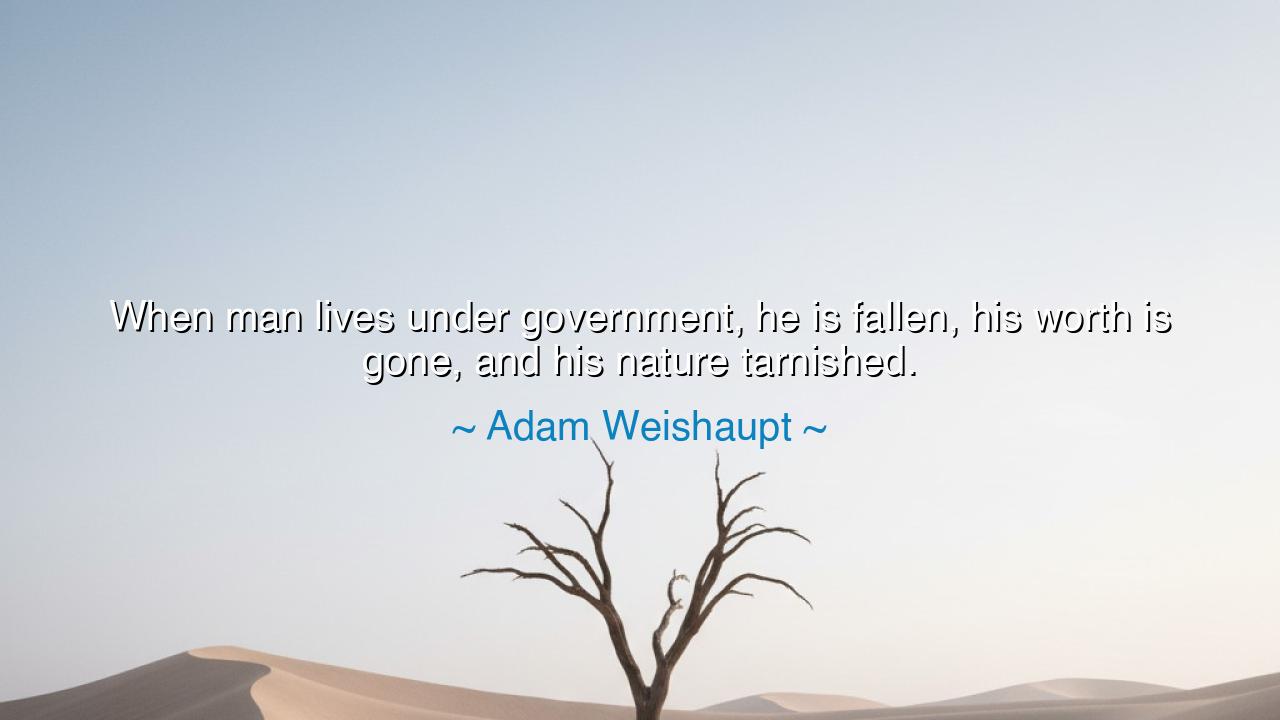
When man lives under government, he is fallen, his worth is gone
When man lives under government, he is fallen, his worth is gone, and his nature tarnished.






In the voice of fire and rebellion, Adam Weishaupt, the Enlightenment philosopher and founder of the Bavarian Illuminati, once declared: “When man lives under government, he is fallen, his worth is gone, and his nature tarnished.” These words, searing and radical, were not born of hatred for order, but of yearning for purity—an ancient longing for a world where man governs himself by reason and virtue alone. In them lies both a condemnation of tyranny and a lament for the frailty of the human spirit, which, once chained by external power, forgets its divine freedom. For Weishaupt’s vision was not merely political—it was spiritual. He saw government as a necessary evil, born from man’s failure to live by truth and conscience.
To understand the meaning of this quote, one must first see the heart of Weishaupt’s philosophy. He believed that the natural state of man was one of freedom, equality, and reason, uncorrupted by authority. In his view, the moment humanity surrendered its sovereignty to rulers, kings, or institutions, it fell from grace. The “fall” he speaks of is not unlike that in the ancient story of Eden—where man, once innocent and free, chose subjugation to knowledge bound by power. To Weishaupt, government was the worldly manifestation of that same loss: the surrender of the divine within man to the will of others. When man lives by laws imposed upon him, rather than by the light of conscience, he becomes less than what he was meant to be—a creature of habit, obedience, and fear, not of truth and reason.
The origin of this thought can be traced to the Enlightenment, that age when Europe awoke from centuries of monarchy and superstition. It was a time when philosophers sought to liberate the human mind from dogma and authority. Yet Weishaupt went further than most. While others, like Voltaire or Rousseau, sought a better form of government, Weishaupt dreamed of a world beyond government itself—a society bound only by knowledge and virtue, where men lived as brothers, guided by moral reason rather than political decree. His Illuminati, formed in 1776, was meant to be a school for such enlightenment—a fellowship that would lift mankind above ignorance and domination. His words, then, are not the cry of an anarchist, but the prayer of an idealist who believed that true order must come from within, not from the lash of law.
History, however, shows the tension between Weishaupt’s dream and humanity’s nature. Consider the ancient story of Athens, the cradle of democracy. There, the people ruled themselves—or so they believed. Yet even in that city of wisdom, fear and ambition corrupted the public spirit. Demagogues rose, laws multiplied, and citizens grew lazy and dependent. The freedom they cherished became a burden too heavy to bear, and they surrendered it willingly to tyrants who promised peace. Thus, Weishaupt’s warning comes to life: that when men rely upon government to shape their virtue, they lose the will to cultivate it themselves. Every age that worships power, even in the name of justice, forges its own chains.
And yet, Weishaupt’s vision, like that of many prophets, was both pure and perilous. For though it calls us toward greatness, it forgets the weakness of the human heart. Man without government may aspire to divine freedom, but he may also descend into chaos. The challenge, then, is not to abolish authority, but to purify it—to build governments that serve the spirit rather than crush it. For government, though corrupt in its form, can yet be redeemed when it becomes the servant of conscience, not its master. The people must not bow before it as before an idol, but shape it as an instrument of their collective virtue.
There is a tale from the French Revolution that embodies this tension. The revolutionaries, inspired by the same ideals that stirred Weishaupt, overthrew a corrupt monarchy in the name of liberty. Yet in their triumph, they birthed another tyranny—the Reign of Terror—proving that even those who seek freedom can become enslaved by power. They destroyed the king but forgot to conquer the king within, that lust for control that dwells in every human heart. It is this inner bondage that Weishaupt sought to illuminate: that man’s true freedom lies not in the destruction of rulers, but in the mastery of himself.
Thus, my children of the modern world, heed the wisdom behind his defiance. Do not mistake obedience for virtue, nor rebellion for freedom. Seek instead the higher law—the law of conscience—that makes each person the ruler of their own soul. Question authority, yes, but also question your dependence upon it. When you look to the state for your worth, your worth will fade; when you look within for guidance, your dignity will rise. The greatest revolution is not fought in the streets, but in the heart—the reclaiming of man’s power to govern himself through reason, truth, and love.
And so remember the words of Adam Weishaupt: that government, though it may protect, can also degrade; that freedom, though perilous, is sacred. Let your obedience be to wisdom, not to rulers. Build a society where conscience rules more strongly than law, and compassion speaks louder than power. For when man lives not under government, but under truth, he stands upright once more—his worth restored, his nature redeemed, his soul no longer tarnished, but shining as it was meant to be: sovereign, radiant, and free.






AAdministratorAdministrator
Welcome, honored guests. Please leave a comment, we will respond soon